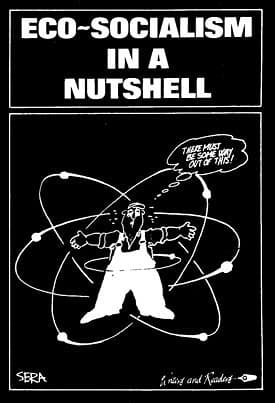 EXCLUSIVE: Climate and Capitalism is proud to republish a long unavailable pamphlet that introduced the coming together of greens and reds in comic strip form, in 1980.
EXCLUSIVE: Climate and Capitalism is proud to republish a long unavailable pamphlet that introduced the coming together of greens and reds in comic strip form, in 1980.
The usually reliable Oxford English Dictionary says the first English-language appearance of the word “eco-socialism” was in the London Times in 1985, as a translation of the German ökosozialismus.
The OED is wrong.
Five years earlier, in 1980, the Socialist Environment and Resources Association, an affiliate of the British Labour Party, published a pamphlet titled Eco-Socialism in a Nutshell.
Today it is very rare, but this summer I found (and paid an exorbitant price for) one copy from an antiquarian book dealer in England. Unfortunately, it had been much read, and as a result was not suitable for scanning.
Fortunately, there’s this thing called the Internet. After some searching, I found Stan Rosenthal, who arranged the original publication for SERA, and wrote the Introduction. He not only wholeheartedly endorsed the idea of republishing it, but he provided background on the pamphlet, and he still had a mint-condition copy, which he very kindly gave me.
The 1980 pamphlet used text and cartoons from the book Nuclear Power for Beginners, published in 1978 by Writers & Readers Publishing Cooperative, so the word eco-socialism was being used in English at least that early. Writers & Readers no longer exists, but the rights to its publications were taken over by the Connecticut based publisher For Beginners LLC: they have kindly given Climate & Capitalism permission to post it.
So here it is – an historic document of ecosocialism. In some ways, Eco-Socialism in a Nutshell shows how new and under-developed the concept of eco-socialism was in 1980. But there is much in it that today’s movement can learn from, especially its insistence on a class approach to the environmental crisis.
As the Leeds Other Paper wrote of this pamphlet in 1980, “it is quick and easy to read” – and, as a columnist in The Guardian wrote, “this is a serious attempt to popularize ideas which ought to be in the mainstream of political debate.”
Download: Eco-Socialism in a Nutshell (PDF 2M)
—–
Ian



Fun to find this old material illustrated by Swedes republished almost 40 years later. I notice that my own drawing with a town and landscape is still included and of course the many drawings made by Kai Anders Sempler. In the 1970s there was not only a vital anti nuclear movement producing a lot of pedagogic material in Sweden but also a network of eco-socialist groups across the country issuing Miljöbulletinen as their newspaper. Maybe this network called Socialistiska miljönätverket, The Socialist Envrionmentalk Network is the strongest expression of eco socialism so far as there were both a number of local groups as well as groups specialized in working conditions among the members. There was also Marxist theoretical magazines and research made.
How far eco socialism was developed as a concept in the 1970s can be discussed. There was sharp criticism against building a red environmental movement as the Socialist Envrionmental network in Sweden also by Marxists as Björn Eriksson. The same kind of criticism is maintained within Friends of the Earth Sweden today, the organization were Marxists as Björn Eriksson had key roles for decades.
Björn Eriksson wrote about the environment and revolution and were among the writers of the first environmnetal declaration made by the 4th International. When I met some of the concerned activists in this international during European Social Forum in Istanbul 2010 it became clear that Björn Eriksson also made theoretical contributions on the issue of popular movement cooperation. These ideas were developed within what today is Friends of the Earth Sweden in the early 1980s and influenced among others the Socialist party/4th International in Sweden rather than what is supposed to be the common way that the left influences the others. But this strategy was lost in the Socialist party in Sweden and has only recently been revived while FoE Sweden have developed the tradition continously. The 4th International I was told in Istanbul got these ideas and used them in the ideas concerning the building of WSF.
As a preparatory conference for the Peoples summit at Rio+20 a meeting to commemorate Björn Eriksson was organized in Göteborg with some 200 participants. His main articles are on the net. Whether his thinking or the eco socialist movement were I was not a part of was an expression of being less advanced than today I do not know. But what I know is that eco socialism in its writing and understanding of the climate justice movement and the strategies ahead are less advanced than what has been carried out by many movements since the 1970s when the local group in Stockholm issued a book calling for low energy society as a response to climate change in 1973. What is for certain is that anglo american ecolsocialism knows very little of the theoretical and practical achievements of the environmental movement so before claiming that it is more advanced today one should maybe look at actual texts other than anglo american.